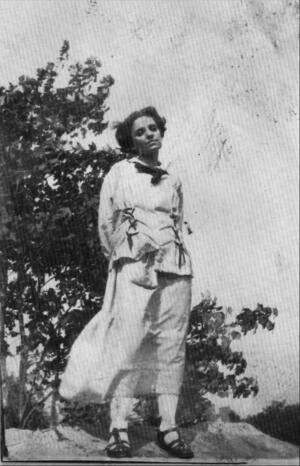Matilda Robbins
Matilda Robbins was born Taube Gitel Rabinowitz in the Ukraine in 1887, and immigrated to New York at age 13, along with her mother and four brothers and sisters, to join her father there. The following year, she joined the workforce as a “finisher” in a shirtwaist factory, trimming the threads off finished garments. When her family moved to Connecticut a year later, she became an apprentice in a millinery (hat) store. By the age of 16, she was self-supporting, working in a variety of different jobs – from shirtwaist and corset factories to grocery and department stores to nursing and childcare.
At age 22, Matilda broke off her engagement to a childhood friend from Russia, and returned to work at a corset factory, where she first became interested in socialism. She found the assembly line approach to factory work monotonous and dehumanizing, and turned to unionizing to advocate for better working conditions. But she did not find much support among the other young women at the factory, who looked to marriage to free them from the drudgery of their work. The local American Federation of Labor chapter to whom she turned for help was equally uninterested in her organizing efforts.
In the Socialist Party of Bridgeport, Connecticut, she met like-minded activists who were interested in industrial unionism. Industrial unionism supported the creation of one union for an entire industry, in contrast to traditional craft unionism, which only organized skilled workers and separated them by specific craft. She learned about the Industrial Workers of the World (IWW), an organization founded in 1905 with the goal of industrial unionism or “One Big Union,” as their slogan proclaimed. She first encountered the “Wobblies” (as IWW members were known) during the 1912 strike in Lawrence, MA, in which she played a small supportive role, leaving her job as a statistical assistant on a survey about working women in Boston to help the workers directly. After the strike, she offered her services to the IWW and was sent to Little Falls, NY, a small textile city where another strike was underway.
In Little Falls, Matilda quickly became the central strike organizer, as many of the other leaders had been jailed. She ran the strike office, organized a strike kitchen, arranged for legal aid for the jailed workers, recruited support from workers in other cities, made sure the picket line formed each day, and raised funds. Her 14 weeks in Little Falls proved her worth to the IWW and marked the beginning of her paid employment as an IWW organizer.
For the next three years, Matilda traveled from one strike to another, from Detroit to Akron to Philadelphia to South Carolina. As one of only two women on the IWW payroll (the other was the well-known Elizabeth Gurley Flynn), Robbins received a great deal of attention from the press, which often referred to her as “the girl organizer” or “the little Russian beauty.”
While organizing was meaningful and exciting work, Robbins also found it exhausting and sometimes frustrating. She grew disillusioned with some of the IWW leadership and felt particularly alienated by their limited vision of women’s roles. While the IWW theoretically supported equal rights for women, as well as sexual freedom, they often promoted a domestic ideal for women and did not always treat women with respect.
Robbins believed that women should have opportunities beyond the roles of wife and mother, access to economic independence and political power, and the right to engage in sexual relationships without marriage, and in the IWW she found a community that shared her bohemian ideals. For more than ten years, she had an intense but tumultuous relationship with another activist, Ben Legere, with whom she had a daughter in 1919.
As a single mother, Robbins remained committed both to her daughter and to progressive politics, working throughout her life as a labor organizer, editor, and social worker. Though she ceased her work as an IWW organizer in 1915, she continued to write for the IWW’s paper for the rest of her life, and she was active in the Socialist Party, serving as the executive secretary of the Los Angeles chapter from 1945-1947. She was also a devoted grandmother. Matilda Robbins died in 1963.
Robbins’ memoir, Immigrant Girl, Radical Woman: An Early Twentieth Century Memoir, can be found here.
Sources:
Michael Cooney, "Socialists, Anarchists, & the Little Falls Textile Strike of 1912," Upstate Earth: An exploration of the past and present of the Hudson and Mowhawk Valleys, January 5, 2011. Accessed December 8, 2011. http://upstateearth.blogspot.com/2011/01/iww-great-textile-strike-of-1912-in.html.
Joyce Shaw Peterson, "Matilda Robbins: A Woman's Life in the Labor Movement, 1900-1920." Labor History 34:1 (1993), 33-56.



